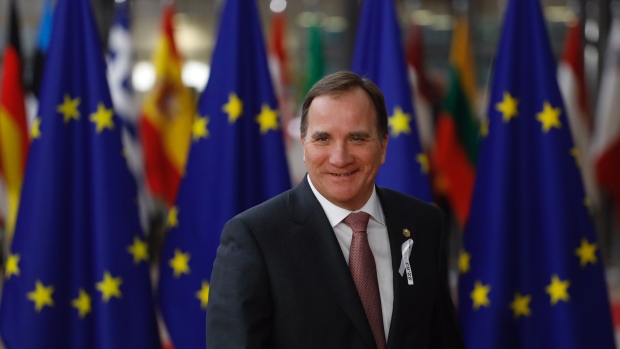Jan 14, 2019
Swedish Government Deal Crumbles as Left Party Rejects Accord
, Bloomberg News

(Bloomberg) -- The deal to solve Sweden’s record-long government impasse looks unlikely to succeed after the Left Party announced it would vote no on making Social Democrat leader Stefan Lofven prime minister.
Left Party leader Jonas Sjostedt announced on Monday that his group won’t provide the necessary votes to back the deal, which was agreed on over the weekend by two centrist parties and the Social Democrats as a way out of Sweden’s political crisis.
Sjostedt said he still wants Lofven to become prime minister, but can’t accept that his party is left without influence.
The rejection will now send all sides back to the drawing board with the speaker expected to make an announcement later on Monday. The speaker could still try to force a vote on Lofven on Wednesday as a way of speeding up the process of finding a government.
Lofven’s deal with the Center Party and Liberals included a pledge to freeze out his former allies in the Left Party and a shift in policy to tax cuts were unpalatable to the former communist party. The bipartisan deal, which broke apart the center-right opposition, was cobbled together to avoid giving influence the nationalist Sweden Democrats.
Voters flocked to the anti-immigration party in September’s election, making it the third-biggest group while handing the Social Democrats their worst result in a century. The conservative Moderates also lost votes, and neither of the two traditional blocs achieved a majority, echoing a broader rise in European populism.
Sweden Democrat leader Jimmie Akesson, who has kept a low profile during the talks over the past four months, said in a Facebook post on Friday that that the disintegration of the center-right bloc came as no surprise and that he now aims to take power in 2022. “The big fight now is between conservatism and left-wing liberalism,” he said.
Center Party leader Annie Loof said the deal was the best available under the circumstances. The party’s priorities were to end the stalemate and keep the fringe parties from exerting influence, while advancing more liberal market policies.
Voters are also lukewarm. In a poll by Inizio, 36 percent of voters picked “disappointment” to describe how they felt, making it the top choice. That was followed by “disbelief,” “resignation” and “relief.” Some 22 percent picked “anger,” and 21 percent opted for "hope.”
Jan Bjorklund, leader of the Liberals, said in an interview on Sunday that he understand if some voters are disappointed, but that speaking of any betrayal is taking it too far.
“We said before the election that we wanted to work with the other bloc to exclude the Sweden Democrats from influence,” he said. “It’s not like we have betrayed what we said. We’re doing what we said.”
With 167 seats of a total of 349, the constellation would still be short of a majority in parliament and would need backing from others to get measures through the legislature. But its budgets would still pass since they only need a plurality.
A potential vote on Wednesday would be the the the third prime minister vote held in parliament since the September election, with both Lofven and Moderate leader Ulf Kristersson having lost earlier. There must be four votes before a new election is held, and the speaker, Andreas Norlen, has scheduled a fourth one for Jan. 23 if necessary.
To contact the reporters on this story: Amanda Billner in Stockholm at abillner@bloomberg.net;Rafaela Lindeberg in Stockholm at rlindeberg@bloomberg.net
To contact the editor responsible for this story: Jonas Bergman at jbergman@bloomberg.net
©2019 Bloomberg L.P.






